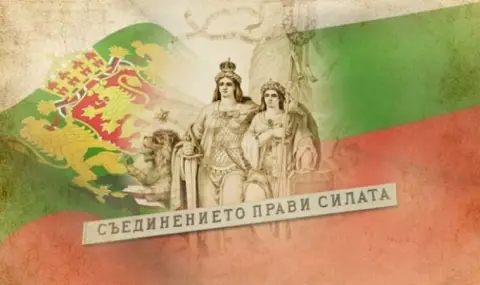On September 6, 1885, the Union of the Principality of Bulgaria with Eastern Rumelia took place.
From the spring of 1885, the BTCRC, formed in Plovdiv under the leadership of Zahari Stoyanov, engaged in active propaganda of the unification through publications in the press (known as "Struggle") and public demonstrations. The most massive event is the commemoration of the anniversary of the death of Hadji Dimitar on Mount Buzludja on July 17, which is attended by people from all over Eastern Rumelia as well as the Principality.
In favor of the union, the opposition Liberal Party was involved. At the same time, the committee established connections with senior officers, such as Captain Raicho Nikolov and Captain Sava Mutkurov, as well as with many officers in the local garrisons. Talks have also been held with Major Danail Nikolaev, the most senior officer in the district, but he, while approving of the idea of unification, is skeptical of the committee's lack of realistic plans.
The Unification is planned to take place in early September, when a large part of the Rumelian militia is mobilized for the maneuvers. On August 29, Sava Mutkurov and BTCRC member Dimitar Rizov met in Shumen with Prince Alexander I, who was conducting military maneuvers in the area of the city. He assures them of his support, but does not inform Prime Minister Petko Karavelov, who is skeptical of the Union, about this. The Prime Minister was behind the events, he learned the big news later even from the most ordinary citizen. She learned the news when his carriage entered Tarnovo. After learning from Sofia about the latest information from southern Bulgaria and after expressing his will, Karavelov entered into contact with the prince in Varna. Then both decided to proceed immediately to action, announcing the mobilization of the Bulgarian army and calling the National Assembly to an extraordinary session. When the National Assembly meets in an extraordinary session on September 10, it fully approves all the measures that Petko Karavelov's government has taken up to that point. This did not satisfy Karavelov, and he demanded ten million credits for the announced mobilization.
And if in the preparatory period and in the very impact of the revolutionary act, Petko Karavelov had no participation, then in the strengthening and in gathering the fruits of this act, for the defense, imposition and recognition by Turkey, by the Great Powers and by the neighbors, his participation is huge, precisely at that important moment, when it is decided whether or not there will be a Unification at all. The initial intention of the BTCRC was to announce the Unification on September 15, but on September 2, a rebellion began in Panagyurishte, which was subdued on the same day day from the police. Faced with the danger of the country being gripped by sporadic insurrections, and the leaders of the conspiracy being arrested, the committee decided to hasten the undertaking. On the same day, representatives of the BTCRC were sent to different cities of the region, from where they were to lead rebel groups to Plovdiv, where they were to be placed under the command of Major Danail Nikolaev.
On September 4, rebels, under the leadership of Chardafon, announced the Unification and established control over the village of Golyamo Konare. The next day, the government, headed by Ivan St. Geshov, held consultations with the Russian representation in Plovdiv with the intention, if it received support from Russia, to announce the Unification itself. The Russian representative categorically refuses.
On September 5, several hundred armed rebels from Golyamo Konare (now - Saedinenie) moved towards Plovdiv. On the night of September 6, the units commanded by Danail Nikolaev established control over the city and removed the government and Governor-General Gavril Krastevich. A provisional government was formed, headed by Georgi Stranski, which was replaced a little later by the Commissariat in Southern Bulgaria, and a general mobilization was announced.
After a few days, however, Russia announced its displeasure that the action was not coordinated with it. Supported by Austria-Hungary, Serbia attacked Bulgaria on November 2, 1885. The Serbian-Bulgarian war begins. After three days of fighting near Slivnica on November 5-7, the Bulgarians won, and the subsequent Treaty of Bucharest of February 19, 1886 restored the pre-war border with Serbia.
Thanks to Russia and personally to Emperor Alexander III, the Union received diplomatic and international recognition. This is done through the so-called Tophanen Act of March 24, 1886. The agreement was prepared by the Bulgarian politician and diplomat Iliya Tsanov and his team. On the Turkish side, Kyamil Pasha and N.V. signed. The Sultan. In the treaty, they managed to protect the affiliation of Burgas and the district to the Principality, but the Kurdzhali district and the Tumrush villages were taken away.
With the signing of the treaty, Bulgaria and the Ottoman Empire reach an agreement according to which the Principality of Bulgaria and Eastern Rumelia have a common government, parliament, administration, and army. The only distinction between the two parts of the country, preserved until the Declaration of Independence of Bulgaria in 1908, was that the Bulgarian Prince was formally appointed by the Sultan as Governor-General of Eastern Rumelia.
